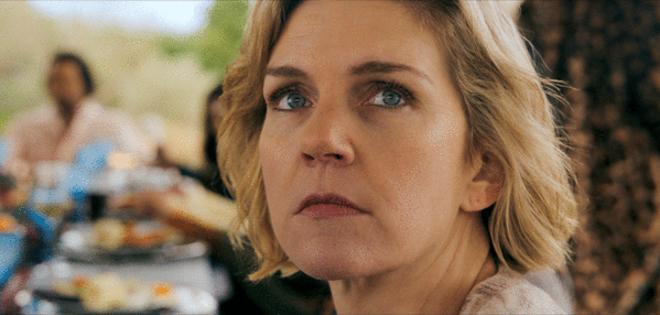Review: In 'Pluribus,' Vince Gilligan examines humanity's right to be unhappy
Published in Entertainment News
Vince Gilligan, of "Breaking Bad" and "Better Call Saul," has gone back to his roots, when he wrote for "The X-Files," with a new sci-fi series, "Pluribus," premiering this week on Apple TV, continuing in its quest to be your home for fancy speculative fiction.
Rhea Seehorn, who played Kim Wexler, Bob Odenkirk's love interest, on six seasons of "Saul," stars as Carol Sturka, a successful but unsatisfied author of historical romance fiction. She regards her work as "mindless crap," but it has made her rich. She's in a personal and professional relationship with Helen (Miriam Shor), who is also her manager. They live on a cul-de-sac in Albuquerque, New Mexico, the city where "Breaking Bad" and "Saul" were set — but don't expect a crossover.
A signal from space is translated into an RNA sequence which is synthesized in a laboratory and, after getting out into the world, becomes the series' central device, a virus-like whatever that infects the globe in a jiffy — except for Carol, a person constitutionally indisposed to its supposed benefits, and a remote dozen others. Described as "a psychic glue capable of binding us all together," the virus links the world into a hive mind, like "Star Trek's" Borg, or the explicitly referenced pod people in "Invasion of the Body Snatchers" — the most frightening of all science-fiction/horror premises. That those infected are compulsively helpful and blandly cheerful, like cult members asking you to "a party," is no less, if not more, disturbing. (The "pluribus" of the title you will recognize from the phrase on the money, if you have spent any time looking at money — "e pluribus unum," or "out of many one." Get it?)
There are ideas about the nature of happiness and an individual's right to be discontented, but Gilligan doesn't seem to be engaging in any targeted social commentary — though as a creative person, I'd guess he's on the side of a less perfect, messier union. (In the infected new world, there is no more crime, no more war and no more zoos, the animals having been set free — but also, seemingly, no fun.) But zombies, even or especially happy ones, don't make television, though you may be sometimes tempted to think so.
This assimilation — not a smooth transition — sends Helen from the series; henceforth Carol's main interlocutor will be Zosia (Karolina Wydra), sent as a mouthpiece from the hive, which is expending a lot of energy figuring out how to overcome Carol's immunity and endeavoring to keep her happy and healthy in the meantime. (They are especially concerned that she hydrate.) Everyone but Carol and those few others not plugged into the mass mind know everything everyone else knows, including how to fly a jet airliner or perform a gynecological examination, or has ever experienced or felt. (Because they know everything, they can be quite pedantic.) But because Zosia has a face, a body and a particular way of speaking, she is, for the viewer — and for Carol — a distinct character. A person.
Not that it has anything to do with the quality of the series, but I find it interesting — even refreshing — that there are no young characters here; indeed, there are few characters at all, the streets being post-apocalyptically empty most of the time. Seehorn, for whom Carol was written, is 53; Wydra is 44; and Carlos Manuel Vesga, who, as Paraguayan survivor Manousos, is positioned to to do something important toward the end of the season, is 49. Samba Schutte, who plays the hedonistic, jolly Mr. Diabaté, is the series' young man, at 42. Gilligan is 58. But I digress.
After quickly establishing the premise, Gilligan shifts into low gear; this is a slow series, yet never a boring one. Great tracts of time pass without dialogue. For most of the way it's Seehorn's show, and she's marvelous — running through a range of emotions, confused, clever, resigned and determined by turns, as she navigates (as they say in the comics) a world she never made, an angry person beating against a sea of contentment, a complicated person in a one-speed society. (She's funny, too; this is fundamentally a comedy, which is not to say a spoof.) She drinks, watches "The Golden Girls" on DVD ("A frown is just a smile turned upside down," we see Betty White say), rides around in a borrowed police car (no police), hits golf balls through office building windows, sings "It's the End of the World As We Know It (And I Feel Fine)" and turns Nancy Drew in order to see how she might turn the world normal. But will the world change her first?
Gilligan has written a number of rules into the plot, both as regards what the hive can't do and what Carol is capable of in order to keep his story going — which it will for a first season of nine episodes (seven of which were available to review) and an already ordered second. (At least.) Just where it's going is anyone's guess. "We've all seen this movie and we know it does not end well," Carol will say, but her saying this seems to indicate it might.
———
'PLURIBUS'
Rating: TV-MA
How to watch: Apple TV
———
©2025 Los Angeles Times. Visit latimes.com. Distributed by Tribune Content Agency, LLC.
















Comments